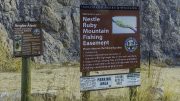With a 2-1 vote, Chaffee County Commissioners determined BlueTriton Brands to be in compliance with the terms of its 1041 permit following a public hearing to review the company’s annual report Tuesday. Commissioner Keith Baker cast the dissenting vote.
The hearing began April 19, and based on public comments from that first meeting, the County requested additional information from Colorado Parks and Wildlife, Colorado Division of Water Resources and the Upper Arkansas Water Conservancy District.
The 1041 permit requires BlueTriton to complete a conservation easement on its land by Dec. 31. Regarding the easement, CPW Wildlife Manager Sean Shepherd submitted a letter stating:
“Colorado Parks and Wildlife is ready to complete this transaction. However, we require an updated legal description that reflects the conveyance of the Blue Triton land to the County. This is the land that Chaffee County needs to complete the widening of County Road 300 along the Arkansas River … . This (Dec. 31) deadline is not an issue for CPW. … The technical/procedural holdup for completing this conservation easement is very much in the County’s control. “
In response to a request from Assistant Chaffee County Attorney Daniel Tom, Division Engineer Bill Tyner with the Colorado Division of Water Resources sent a letter stating, “Blue Triton/Nestle is in compliance” with all relevant state rules.
Upper Ark District General Manager Terry Scanga attended the meeting in person. He emphasized that the District had over-replaced water taken by BlueTriton even though water replacements were short by 1.2 acre-feet in October.
Scanga said this sometimes happens because the District relies on projections to time replacement water releases. When replacement projections don’t match usage, the District must do a “reconciliation.”
Scanga said the 1.2 acre-foot reconciliation was completed in the first week of November and that the District had shifted from monthly to weekly reconciliations for BlueTriton to ensure more accurate projections and smaller reconciliations.
In response to a comment about exporting water out of the valley, Scanga pointed out that breweries, distilleries and even cattlemen export water since cattle are 80% water. “When you export your hay and your produce out of the valley, you’re exporting water.”
Commissioner Rusty Granzella asked what would happen to BlueTriton’s operations if imports of West Slope water were cut off.
Scanga affirmed that BlueTriton would have to stop pumping, noting that many other water uses would also be curtailed under that scenario, likely including all outdoor watering.
Commissioner Greg Felt, who also serves as vice chair of the Upper Ark District, commented that the District can curtail lower-priority water replacements during times of shortage to ensure water availability for critical needs.
Scanga confirmed that the District has different categories of priorities and that all of the District’s replacement-water agreements have emergency provisions to accommodate potential water shortages. If needed, the District can reduce its annual water replacements from 1,000 acre-feet to 300. “That would be pretty severe, but that’s where it could go.”
“Can you tell us anything about the aquifer?” Granzella asked.
“There are a lot of studies out there,” Scanga said “and we have a well network that is continuously studied, starting back in the early ’80s-late ’70s that the USGS does for us. … On the heels of the 2002 drought, which is the worst on record in this basin, the conclusion was that, (for) the top 300 feet of aquifers, there’s something like 1-2% of that water that would be used, projected out to the year … 2050.
Scanga concluded, “We’ve got a robust aquifer. … Chaffee County’s very well-positioned in terms of groundwater.”
Chaffee County consultants, including water attorney David Shohet, concluded that BlueTriton is in compliance with the 1041 permit requirements and state water regulations.
Larry Lawrence, natural resource manager for BlueTriton’s Western Region, responded to public comments from April 19, indicating that BlueTriton has agreed to a 100-foot easement off the centerline to the east and has increased the easement from 3 to 10 feet to the west.
Lawrence said the increased easement will ensure that the County can widen County Road 300 from one lane to two to improve safe access to the Ruby Mountain AHRA site and Browns Canyon National Monument.
Referring to John McGowan’s comments about holding BlueTriton accountable for the conservation easement, Commissioner Felt raised the question of consequences for failure to have the easement in place by the Dec. 31 deadline.
Assistant County Attorney Daniel Tom recommended that the County Commissioners convene a hearing if BlueTriton fails to meet the Dec. 31 deadline for establishing the conservation easement and, if needed, direct the County Attorney’s Office to “seek relief” at that time.
Commissioner Baker responded, “In order to show how serious we are, I believe we have grounds to implement a probationary status now.” Baker then advocated for passing a resolution codifying Tom’s recommendations.
On Tom’s recommendation, the Commissioners agreed to address BlueTriton’s conservation easement compliance at the first feasible opportunity in October.
- Conservancy districts oppose major water purchase by Aurora - April 15, 2024
- ARWC releases February River Report - March 10, 2024
- State official to discuss water administration changes today in Salida - March 8, 2024




